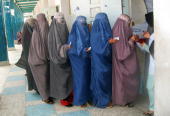 So the Afghans have now voted in their second-ever presidential elections. Well, some of them have. But with the extent of voting unclear, accusations of poll-rigging rife and violence claiming countless innocent lives, it is far too early to call the process a success.
So the Afghans have now voted in their second-ever presidential elections. Well, some of them have. But with the extent of voting unclear, accusations of poll-rigging rife and violence claiming countless innocent lives, it is far too early to call the process a success.
Today, the Elections Commission will likely release preliminary results, with a full tally expected in a month’s time. Wisely, key US and UK officials have been circumspect in their pronouncements. The EU Monitoring Mission has said the election was “mostly good and fair.” But Afghan observers cited “some credible allegations of fraud and mistakes by elections officials.” NDI, the US organisation, said the poll “involved serious flaws that must be addressed in order to build greater confidence in the integrity of future elections.”
So, it’s really too early to tell what really happened on election day. But what to make of the process so far? Let us look at the positive side first. Unlike in previous elections, there was an active and modern campaign period, with televised debates and rallies and political ads, even campaigns text messaging voters. This is new and positive.
The Afghan army and police also seem to have done well, dealing with pre-election and election day violence confidently. Out of some 6,500 polling stations, 6,200 were said to have opened. Millions of Afghans defied the Taliban’s threats and cast their ballots.
But then there is the much-reported downside. Presidential contender Abdullah Abdullah is alleging fraud conducted by the Karzai administration and clearly hinting he might not accept the outcome (though he also said he would pursue his claims peacefully – for now). At least 26 people were killed in election-related violence, fewer than had been feared but still a high number in a country patrolled by 64,500 NATO troops.
If none of the candidates get more than 50 percent of the vote, a run-off will take place in October. This will give the Taliban another chance to cause mayhem. But perhaps equally worrying, with Hamid Karzai likely to face-off with Abdullah Abdullah, the second round of voting may spark the kind of ethnic conflict between Pashtuns and Tajiks that many have feared for years. Yet if President Karzai is declared a winner outright, then that may spark tensions or an Iran-style face-off. There are only bad options it seems. Over on Abu Muqawama, Andrew Exum, who sat in on General Stanley McChrystal’s recent review, tries to make sense of it all.






Comments